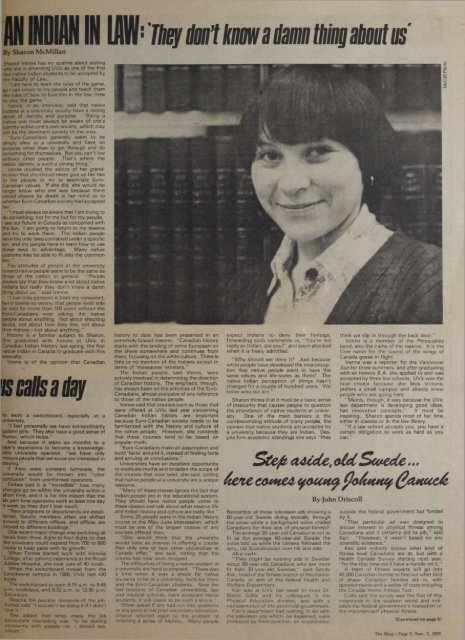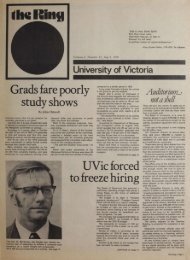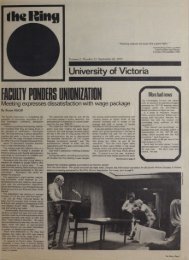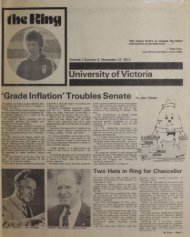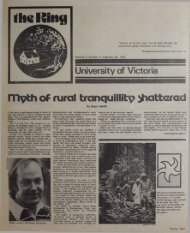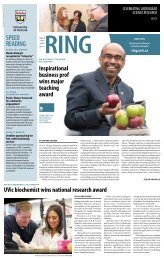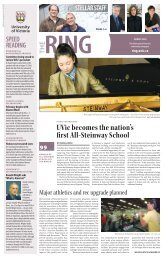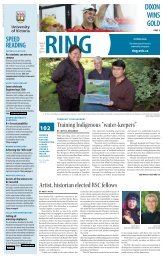of Victoria
Volume 2, Number 16, November 3, 1976 - The Ring - University of ...
Volume 2, Number 16, November 3, 1976 - The Ring - University of ...
Create successful ePaper yourself
Turn your PDF publications into a flip-book with our unique Google optimized e-Paper software.
Sharon Venne has no qualms about stating<br />
why she is attending UVic as one <strong>of</strong> the first<br />
two native Indian students to be accepted by<br />
the Faculty <strong>of</strong> Law.<br />
"I am here to learn the rules <strong>of</strong> the game,<br />
so I can return to my people and teach them<br />
the rules <strong>of</strong> how to function in the law, how<br />
to play the game.<br />
Venne, in an interview, said that native<br />
Indians at a university usually have a strong<br />
sense <strong>of</strong> identity and purpose. "Being a<br />
native one must always be aware <strong>of</strong> one's<br />
identity within one's own society, which may<br />
not be the dominant society <strong>of</strong> the area.<br />
"Euro-Canadians generally seem to be<br />
simply alive at a university and have no<br />
purpose other than to get through and do<br />
something for themselves. But you can't live<br />
without other people. That's where the<br />
native identity is such a strong thing."<br />
Venne recalled the advice <strong>of</strong> her grandmother<br />
that she should never give up her ties<br />
to her people or try to assimilate Euro-<br />
Canadian values. If she did, she would no<br />
longer know who she was because there<br />
would always be doubt in her mind as to<br />
whether Euro-Canadian society had accepted<br />
her.<br />
"I must always be aware that I am trying to<br />
do something, not for me but for my people.<br />
I see our future in Canada as concerned with<br />
the law. I am going to return to my reserve<br />
and try to work there. The Indian people<br />
have the only laws contained under a specific<br />
act, and my people have to learn how to use<br />
these laws to advantage. Many native<br />
customs may be able to fit into the common<br />
law."<br />
The attitudes <strong>of</strong> people at the university<br />
toward native people seem to be the same as<br />
those <strong>of</strong> the nation in general. "People<br />
always say that they know a lot about native<br />
Indians but really they don't know a damn<br />
thing about us," said Venne.<br />
"I can only perceive it from my viewpoint,<br />
but it seems so wrong that people lived side<br />
by side for more than 100 years without the<br />
Euro-Canadians ever asking the native<br />
people about anything. Not about shooting<br />
ducks, not about how they live, not about<br />
their history —not about anything."<br />
History is a familiar subject to Sharon.<br />
She graduated with honors at UVic in<br />
Canadian Indian History last spring, the first<br />
native Indian in Canada to graduate with this<br />
specialty.<br />
Venne is <strong>of</strong> the opinion that Canadian<br />
to work a switchboard, especially at a<br />
university.<br />
"I feel personally we have extraordinarily<br />
patient girls. They also have a good sense <strong>of</strong><br />
humor, which helps."<br />
And because it takes six months to a<br />
year's experience to become a knowledgeable<br />
university operator, "we have only<br />
mature people that we know are interested in<br />
staying."<br />
If there were constant turnovers, the<br />
university would be thrown into "utter<br />
confusion" from uninformed operators.<br />
Forbes said it is "incredible" how many<br />
changes go on within the university within a<br />
short time, and it is for this reason that the<br />
six part-time operators work at least one day<br />
a week so they don't lose touch.<br />
"New programs or departments are established,<br />
faculty members <strong>of</strong>ten are shifted<br />
around to different <strong>of</strong>fices, and <strong>of</strong>fices are<br />
moved to different buildings."<br />
One recent major change was switching all<br />
locals from three digits to four digits so that<br />
the university could expand from 700 to 800<br />
locals to keep pace with its growth.<br />
When Forbes started work with <strong>Victoria</strong><br />
College, after gaining experience at the Royal<br />
Jubilee Hospital, she took care <strong>of</strong> 40 locals.<br />
When the switchboard moved from the<br />
Lansdowne campus in 1966, UVic had 400<br />
locals.<br />
The switchboard is open 8:15 a.m. to 9:45<br />
p.m. weekdays, and 8:30 a.m. to 12:30 p.m.<br />
Saturdays.<br />
Despite the peculiar demands <strong>of</strong> the job,<br />
Forbes said "I wouldn't be doing it if I didn't<br />
love it."<br />
She added that what made the job<br />
particularly interesting was "to be dealing<br />
constantly with people —or, I should say,<br />
voices."<br />
history to date has been presented in an<br />
extremely biased manner. "Canadian history<br />
starts with the landing <strong>of</strong> some European on<br />
the shore somewhere and continues from<br />
there, focusing on the white culture. There is<br />
little or no mention <strong>of</strong> the Indians except in<br />
terms <strong>of</strong> 'massacres' etcetera."<br />
The Indian people, said Venne, were<br />
actively involved in determining the direction<br />
<strong>of</strong> Canadian history. The emphasis, though,<br />
has always been on the activities <strong>of</strong> the Euro-<br />
Canadians, almost exclusive <strong>of</strong> any reference<br />
to those <strong>of</strong> the native people.<br />
Venne said that courses such as those that<br />
were <strong>of</strong>fered at UVic last year concerning<br />
Canadian Indian history are important<br />
because Euro-Canadian society needs to be<br />
familiarized with the history and culture <strong>of</strong><br />
the native people. However, she contends<br />
that these courses tend to be based on<br />
popular myth.<br />
"Euro-Canadians make an assumption and<br />
build 'facts' around it, instead <strong>of</strong> finding facts<br />
and arriving at conclusions."<br />
Universities have an excellent opportunity<br />
to eradicate myths and broaden the scope <strong>of</strong><br />
the courses that now exist, she said, adding<br />
that native people at a university are a unique<br />
resource.<br />
"Many <strong>of</strong> these classes ignore the fact that<br />
Indian people are in the educational system.<br />
They should have native people come to<br />
these classes and talk about what reserve life<br />
and Indian history and culture are really like."<br />
Some 29 people were in the Indian history<br />
course at the May-June intersession, which<br />
must be one <strong>of</strong> the largest classes <strong>of</strong> any<br />
courses <strong>of</strong>fered then.<br />
"One would think that the university<br />
would have an interest in <strong>of</strong>fering a course<br />
that only one or two other universities in<br />
Canada <strong>of</strong>fer," she said, noting that the<br />
course has now been dropped.<br />
The difficulties <strong>of</strong> being a native student at<br />
a university are hard to pinpoint. "There was<br />
a time when it was a shock for native<br />
students to be at a university, both for them<br />
and the Euro-Canadian students. Now the<br />
last bastions <strong>of</strong> Canadian universities, law<br />
and medical schools, have accepted native<br />
students, it will cease to be such a shock."<br />
When asked if she had run into problems<br />
at any point in her post-secondary education,<br />
Sharon referred again to the problem <strong>of</strong><br />
retaining a sense <strong>of</strong> identity. Many people<br />
expect Indians to deny their heritage,<br />
forwarding such comments as, "You're not<br />
really an Indian, are you?" and seem shocked<br />
when it is freely admitted.<br />
"Why should we deny it? Just because<br />
white people have developed the misconception<br />
that native people want to have the<br />
same values and life-styles as them? The<br />
native Indian perception <strong>of</strong> things hasn't<br />
changed for a couple <strong>of</strong> hundred years. We<br />
know who we are."<br />
Sharon thinks that it must be a basic sense<br />
<strong>of</strong> insecurity that causes people to question<br />
the attendance <strong>of</strong> native students at university.<br />
One <strong>of</strong> the main barriers is the<br />
condescending attitude <strong>of</strong> many people, the<br />
opinion that native students are accepted by<br />
a university because they are Indian. Despite<br />
firm academic standings she says "they<br />
Remember all those television ads showing a<br />
60-year-old Swede skiing stoically through<br />
the snow while a background voice chided<br />
Canadians for their lack <strong>of</strong> physical fitness?<br />
The average 30-year-old Canadian is not as<br />
fit as the average 60-year-old Swede the<br />
voice told us while the camera followed the<br />
spry, old Scandinavian over hill and dale.<br />
All a myth.<br />
"They might be running ads in Sweden<br />
about 60-year-old Canadians who are more<br />
fit than 30-year-old Swedes," said Sandy<br />
Keir, head <strong>of</strong> the fitness branch <strong>of</strong> Recreation<br />
Canada, an arm <strong>of</strong> the federal Health and<br />
Welfare Department.<br />
Keir was at UVic last week to meet Dr.<br />
Martin Collis and his colleagues in the<br />
Physical Education division, and with a<br />
representative <strong>of</strong> the provincial government.<br />
Keir's department had nothing to do with<br />
the television ads which, he explained, were<br />
produced by Participation, an organization<br />
By John Driscoll<br />
think we slip in through the back door."<br />
Venne is a member <strong>of</strong> the Petequakey<br />
band, also the name <strong>of</strong> the reserve. It is the<br />
Cree name for the sound <strong>of</strong> the wings <strong>of</strong><br />
Canada geese in flight.<br />
Venne was a reporter for the Vancouver<br />
Sun for three summers, and after graduating<br />
with an honors B.A. she applied to and was<br />
accepted by three law schools. UVic was the<br />
final choice because she likes <strong>Victoria</strong>,<br />
prefers a small campus and already knew<br />
people who are going here.<br />
"Mainly, though, it was because the UVic<br />
law department is developing good ideas,<br />
has innovative concepts." It must be<br />
inspiring. Sharon spends most <strong>of</strong> her time<br />
either in classes or in the law library.<br />
"If a law school accepts you, you have a<br />
certain obligation to work as hard as you<br />
can."<br />
outside the federal government but funded<br />
by it.<br />
"That particular ad was designed to<br />
arouse interest in physical fitness among<br />
Canadians and it certainly did its job," said<br />
Keir. "However, it wasn't based on any<br />
scientific evidence."<br />
Keir said nobody knows what kind <strong>of</strong><br />
fitness level Canadians are at, but with a<br />
Health Canada Survey starting next year,<br />
"for the first time we'll have a handle on it."<br />
A team <strong>of</strong> fitness experts will go into<br />
40,000 Canadian homes to find out what kind<br />
<strong>of</strong> shape Canadian families are in, with<br />
Questionnaires and a series <strong>of</strong> tests including<br />
the Canada Home Fitness Test.<br />
Collis said the survey was the first <strong>of</strong> this<br />
magnitude in the western world and indicates<br />
the federal government's realization <strong>of</strong><br />
the importance<strong>of</strong> physical fitness.<br />
(Continued on page 6)<br />
The Ring; -Page 5, Nov. 3, 1976


